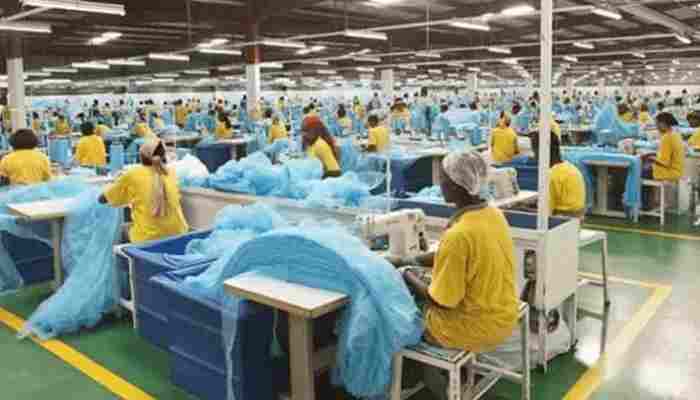Eight in 10 Nigerian manufacturers do not plan to hire more employees in the nearest future, the result of FBNQuest’s Purchasing Managers’ Index (PMI) survey has shown.
This means there is no relief in sight for Nigeria’s unemployment rate that ranked the world’s second-highest in 2020.
“We are not surprised that over 80 percent of our respondents are cautious to hire more people because the economy has not grown in per capita terms in six years,” research analysts at FBNQuest said.
While the economy of Africa’s most populous nation expanded by the most since 2014 in the three months ending June (Q2’21), data by the Nigerian Economic Summit Group (NESG) shows that Nigeria’s real economy declined between the first and second quarter of this year.
The data suggest that real GDP reported a 0.79 percent decline in Q2 2021 to N16.7 trillion in the quarter to June from N16.8 trillion reported in the first three months of 2021.
NESG projects a lower GDP growth for Nigeria in the third and fourth quarters of 2021 as it expects the base effect to fade out.
According to the private sector-led think-tank and policy advocacy group, Nigeria needs to fix stalling policies like the FX crisis, petrol subsidy, insecurity and among others to see the much-needed growth that can boost employment.
Economic growth in Africa’s top crude producing nation averaged 1.2 percent between 2015 and 2020. The problem with that is the population grew two times faster at an average of 2.6 percent per year.
Since 2017, when oil-dependent Nigeria emerged from its first economic recession in five years (exited its second in 2020), not only has the country’s economic growth been sluggish but only a few sectors triggered the expansion, further undermining the country’s capacity to create enough jobs to meet the growing number of labour market entrants.
Unemployment in Africa’s most populous nation rose to its highest in over a decade at 33.3 percent in the fourth quarter of 2020, a mirror of the fragile state of Nigeria’s economic progress.
The weak per capita income of Africa’s largest economy means that the economy is not creating more opportunities to accommodate a fast-rising population, a factor that has continued to drive the number of jobless people.
Nigeria’s unemployment rate is projected to increase to 40 percent by the end of 2021, according to Doyin Salami, chairman of the Presidential Economic Advisory Council.
“The sectors with significant growth use very little labour,” the Presidential Economic Advisory Council said at the sixth Regular Meeting.
While the sectors of the Nigerian economy that require less labour have been growing at a pace faster than their peers, the labour-intensive sectors with the potential to reduce the country’s 33.3 percent unemployment rate in the fourth quarter of 2020 have either been in recession or growing at a sluggish rate.
A high unemployment rate in a country like Nigeria whose economy is described as one that is stagflated (a blend of high inflation rate and slow economic growth) means poor Nigerians will become poorer in real terms, and the middle class will get thinned out.
Before COVID-19, about 80 million of Nigeria’s 200 million people were living on less than the equivalent of $1.90 a day. The pandemic and population growth could see that figure rise to almost 100 million by 2023, notes the World Bank.
Due to its labour-intensive nature, Nigeria’s manufacturing sector has been described as one that could help ease the country’s rising unemployment but due to the harsh operating environment; the sector has continually performed below its potential.
Nigeria retains a long list of economic reforms that can unlock economic growth and reduce poverty but have been stuck. Decrepit infrastructure and the lack of a functional rail system means Apapa, which houses Nigeria’s main post, remains a crying shame.
When transporting imported goods from the warehouse in Nigeria’s busiest seaport, businesses spend an average cost of $2,050, according to a research firm, SBM Intelligence. This is nearly ten times the $208 it cost to transport containers from Durban Harbour to the South African warehouse. In Ghana, it cost $285 to transport containers to a local warehouse.
Nigeria’s PMI, a gauge for manufacturing sentiments, declined by 0.7 points in October on FX volatility and social unrest in the eastern and northern parts of the country, according to data compiled by FBN Quest and NOI.
The index which declined from 50.3 to 49.6 points was mirrored across three of the five sub-indices, according to the data.
To reduce unemployment, the FGN has launched several initiatives, one of which is its special public works programme which was flagged off in January. The N52bn initiative seeks to employ
774,000 Nigerians (ie 1,000 for each local government area).
“What is currently missing from the mix is the robust GDP growth including the creation of jobs and wealth through manufacturing that helped to lift eight million people out of poverty in Bangladesh between 2010 and 2016. The reverse has happened in Nigeria (the population in poverty has risen),” FBNQuest said.
source: businessday ng




